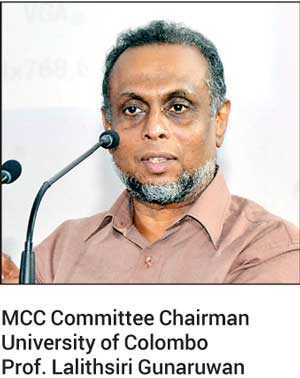Sunday Feb 22, 2026
Sunday Feb 22, 2026
Saturday, 4 July 2020 00:15 - - {{hitsCtrl.values.hits}}
 By Uditha Jayasinghe
By Uditha Jayasinghe
The Sri Lankan Government has the capacity to decide not to sign the $ 480 million Millennium Challenge Corporation (MCC) agreement, head of the four-member committee appointed to compile an evaluation report on the grant said yesterday.
The evaluation report was handed over to President Gotabaya Rajapaksa and Prime Minister Mahinda Rajapaksa last week. It was subsequently released to the public and was also presented to the Cabinet of Ministers on Wednesday.
Participating at a press conference on the findings and recommendations of the report committee chair Prof. Lalithasiri Gunaruwan told reporters the Government has the option of declining to sign the agreement. The other committee members were former Transport Ministry Secretary D.S. Jayaweera, Nihal Jayawardena PC and architect Nalaka Jayaweera.
Prof. Gunaruwan also reiterated that their conclusion was the agreement should not be signed in its present form. He argued that during their evaluation it was found that the correct Government institutions had not been consulted enough on project selection and implementing the agreement would run contrary to Sri Lankan law and Constitution.
“We had to conclude that Sri Lanka’s institutions had not adequately participated nor been consulted in selecting the projects and calculating the economic rate of returns on them. Whether these land and transport projects could have impact on other segments of the economy or the sovereignty of the country or its national security have not been properly evaluated. Even on the conditions of the agreement we found they were not in line with Sri Lankan law and constitutional provisions,” he said.
“We concluded that the proposed compact if signed by the Government would basically put the country into difficulty, perhaps like Nepal, so we have proposed that it be presented to Parliament and then signed,” he added.
Referring to the segment of the grant that was to be used to set up a land bank, Prof. Gunaruwan questioned how the Government could practically implement a provision that would likely have required a constitutional amendment as land was a subject that is devolved to the provinces under the 13th Amendment.
Under the land bank project 28% of Sri Lanka’s land in seven provinces would have been included, he claimed. He also argued why education, healthcare, trade or other sectors of the economy could not have been considered as more appropriate projects to be implemented under the MCC grant.
“The public needs to understand that the funds Sri Lanka could have gotten under the MCC grant is different from other aid it has received in the past from the US. Obtaining this grant requires the establishment of a limited guarantee company, which will be headed by local public officials but other Government branches such as the Auditor General cannot question its functions.
“Only a Court of Appeal can counter its actions but the company has to take permission from the MCC regularly. This is like taking money to build a house but giving the key to the lender. There is no access to the Sri Lankan Government,” he said. However, the committee chairman conceded that once signed the Government could exit the agreement.
Prof. Gunaruwan went on to say that if it was the Government’s decision to renegotiate the MCC grant it should be done with far greater transparency, involving Government agencies and the agreement should be presented to Parliament before it is signed. He also contended that more aspects of the economy should be considered to understand how the grant could be spent to get the most gains and minimise adverse impact to the public.